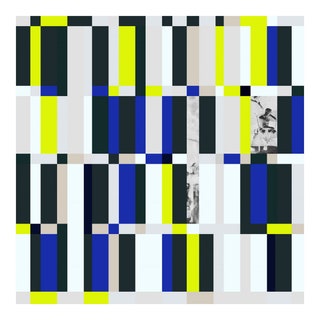On its second album of 2021, the London group fastidiously projects electronic music, pop, and jazz through the twin prisms of post-rock and classical minimalism.
Portico Quartet’s music should easy to describe, but it turns out that it’s not, even for them. They often call it “widescreen,” which is the kind of cinematic metaphor that music reviewers resort to when they can’t think of anything else. They named themselves Portico Quartet because they first played under a portico as a quartet. When they released Terrain earlier this year, saxophonist and keyboardist Jack Wyllie explained, “The core of it is having a repeated pattern, around which other parts move in and out, and start to form a narrative.” But that is practically a textbook definition of music itself, and the vagueness of his description mirrors the faint sense of blankness that mysteriously blankets this group’s consistently fine work.
To be fair, Wyllie also said that Terrain was inspired by American minimalism, which is obvious, and the Japanese composer Midori Takada, which is a fresh surprise. Monument, Portico Quartet’s second album of 2021, really is a change of pace, in that the pieces are short instead of long and starched with electronic dance music instead of ambient. But the overall schematic seems largely the same, as it does across their albums. Their gifts for melodic immediacy, rhythmic precision, and supple finishing allow them to iterate on a slender template so pleasingly that you feel like Richie Rich whining if it gets predictable: Aw, Mom, filet mignon again?
The group, based in London, features Wyllie leading percussionist Duncan Bellamy, bassist Milo Fitzpatrick, and keyboardist Keir Vine. Everyone has at least a little something electronic in their setup, and the rhythm section prominently features the hang, a UFO-shaped steel drum that was invented about 20 years ago. They generally start a track by weaving a long, flashing pattern of interlocked ostinatos from the threads of the minimalist canon. After caressing and washing it with drums, they eventually drop a roomy beat, cueing the saxophone to lyricize freely. This is almost unvarying. Still, the musicians riff on their elected straits as adeptly as seasoned sonneteers.
Monument lies at some remote waystation between ECM and Ninja Tune (which actually did release Living Fields, an electronic pop album by three of the group’s members), with a coolly smoldering wind blowing in from somewhere in Scandinavia. “Opening” seems to suffuse the questing post-rock of Jaga Jazzist with the gradual glow of Jóhann Jóhannsson. The glassy club music of “Impressions” is fogged with solos that recall the gentler side of Arve Henriksen. “Ultraviolet” is Terry Riley trying drum’n’bass. Afterimages of Aphex Twin and Boards of Canada overlay those of Philip Glass and Ryuichi Sakamoto. The ratios change; the music somehow doesn’t. The ensemble fastidiously conjures shades of electronic music, pop, and jazz from the center of its comfort zone as an elegant post-rock band transfixed by Steve Reich.
It’s odd, then, that they’re usually reviewed and discussed as jazz, despite this being their haziest association. Yes, the hang plays a wafting, vibraphone-like role; the ensemble is more or less a rhythm section built around a soloist; and Art in the Age of Automation did reach No.1 on the UK jazz chart a few years ago (though, as Wyllie gamely conceded, that doesn’t take a lot of sales these days). But the pieces feel too tightly composed to have much room for meaningful improvisation, and it’s impossible to imagine Portico Quartet’s airlocked minimalism as an interpretative device.
Though the members have outside projects—such as Paradise Cinema, where Wyllie plays with percussionists in Dakar—they mainly collaborate with one another. They don’t seem to have much to do with the bustling London jazz scene in which they are ostensible veterans, 13 years after their Mercury Prize-nominated debut; their minimalist fixation is not really in step with the diasporic innovation happening there in recent years. The title track of Monument starts with a boom-bap swagger, but like most surges of inspiration here, it’s quickly tamed into a mild crescendo by the slow, simple intervals revolving through the saxophone. Without traditional training, the band has its origins in busking in front of London’s National Theatre rather than getting into Juilliard. I’ve hardly ever read them mention another jazz artist, outside of putting Pharoah Sanders on an XLR8R mix that botched the spelling of his name (which, to be fair again, probably wasn’t their fault). None of this is a knock; they simply demonstrate relatively few of jazz’ outward signs—least of all its mutating, evolving nature in the current century.
Portico Quartet are hard to define not because they defy external conventions, like jazz does now, but because they hew so closely to internal ones. While Monument is probably one of their best albums, the narrative beneath their deeply carved patterns remains as elusive as ever. In a way, the group is well symbolized by its lone distinguishing quirk, the hang: a mesmerizing instrument without a rich historical or cultural tradition, floating lightly, for better or worse, without that ballast.



0 comments:
Post a Comment